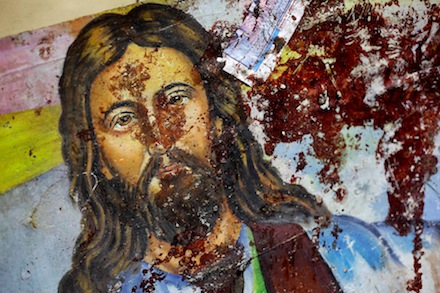The men were roughly clothed, generally in coarse blue cloth, very carelessly put together. The women came in with their invariably noiseless, gliding step, in very wild garb; they were shrouded in blankets, their heads closely covered with various wrappings ….
Susan Fenimore Cooper, daughter of the famous novelist, shared these impressions in a series of articles called “Missions to the Oneidas” in The Living Church in 1885 and 1886.
I spent this past week at the Episcopal Tri-History Conference in Oneida, Wisconsin.
Parishioners at Church of the Holy Apostles and members of the Oneida Nation were our very gracious hosts as participants from the three historical societies of the Episcopal Church met to consider the encounters between Episcopal and Anglican churches and the indigenous people of North America.
Despite the appreciative portrayal of writers like Susan Fenimore Cooper, the tragic history of those encounters is more about European and American colonists’ attempts to “civilize” indigenous people or, frankly, to take their land, send them to distant reservations, and transport their children to residential boarding schools in order to “kill the Indian and save the man.”
The archivists and historians in the US and Canada have become painfully aware how church and state conspired over the last three centuries to make indigenous people and their cultures disappear.
+ + + + +
I wonder if the prophet Elijah standing by the entrance to his cave on Mt. Horeb appeared like the Oneida women, wrapped in his mantle and shrouded in the “sound of sheer silence.”
He, too, was being threatened with disappearing – Jezebel and Ahab had marked him for death after he prevailed over the false prophets loyal to the king and caused rain to fall after three years’ drought. He had run forty days and nights into the desert, far from his home.
But God gave Elijah a command: Stand on the mountain. Wrap your mantle around you and do not be swept away by the wind, the breaking rocks, the quaking ground, the fire, the noise.
Elijah must not fear those who seek his life, but he is to go back across the desert and fulfill God’s mission.
Keep your clothes on, and keep speaking truth to power.
+ + + + +
What a powerful jolt Jesus got as he stepped off the boat after crossing the Sea of Galilee!
“What have you to do with me, Jesus, Son of the Most High God? I beg you, do not torment me!”
The poor Gerasene man’s many demons shouted in his head and caused him to shout at Jesus.
Jesus gives the demons a command – leave this man alone – and they rush out into a herd of pigs, leaving the man sitting at the feet of Jesus, “clothed and in his right mind.”
Though the townspeople are even more freaked out than they had been by the naked man living in the tombs – and he and they both probably wish he’d leave with Jesus – the man is sent home instead to share the good news of what God has done in his life.
Keep your clothes on, and keep sharing good news with your family and your neighbors.
+ + + + +
Paul had neighbors all around the Mediterranean, and Galatia must have been a fairly cosmopolitan Roman province, where “Jews and Greeks, slaves and free,” men and women lived and worked.
He really struggled to keep the members of his congregation there from going back to the old Law, though, to rules and regulations about who was in or who was out, what food was right to eat, what days were appropriate to observe as festivals.
Paul also struggled, according to Edward Blair, against “the Jewish nationalism of the time, which was emphasizing separation from Gentiles and strict loyalty to everything Jewish, not only in Palestine, but in the Roman world as well” (Blair 297).
His people’s focus on legalism and political separation, their disunity, is disheartening to him. “I am afraid that my work for you may have been wasted,” he says.
“As many of you as have been baptized into Christ have clothed yourselves with Christ. There is no longer Jew or Greek, there is no longer slave or free, there is no longer male and female, for all of you are one in Christ Jesus.”
Keep your clothes on and act like you are one in Christ Jesus!
+ + + + +
Bishop Mark MacDonald is now the National Indigenous Bishop of the Anglican Church of Canada.
In his keynote address at this week’s conference, Bishop Mark spoke about the resilience of Native American communities like the Oneida Nation and like many of the First Nations among whom he ministers in Canada.
The Oneida, for example, though they sided with the colonists in the Revolutionary War, lost their land in New York state to their neighbors and had to relocate to Wisconsin. Here in Wisconsin, the same New York fur traders and logging companies who had driven them from their land tried to do it to them all over again.
Nevertheless, over the past 200 years, the Oneida Nation has rebounded in many ways. On the civic side the Oneida Nation is a leader among Native American communities, and on the religious side Owanah Anderson, the former native missioner of the Episcopal Church, praised Holy Apostles as “the Canterbury Cathedral of Native American ministry.”
But Bishop Mark went on to talk about a harder truth. Despite centuries of policies enacted by church and state meant to dispossess them of their land, wipe out their language, and eliminate their religion and culture, the conversion of indigenous people to Christianity has been widespread. Some 80% of First Nations people in Canada are baptized, Bishop Mark said, a much higher percentage than their “more rapidly secularizing” neighbors.
He suggests that about 5% of indigenous people practice their traditional religion, and about 5% practice “normal” European Christianity. The broad middle – most of whom are baptized, remember – make their way in the world as best they can, and are to be commended for their resilience in the face of efforts (even by fellow Christians) to make them disappear.
The resilience of communities like the Oneida, Bishop Mark says, “reeks of resurrection. It smells like the Gospel!”
The resilience of others in the face of hardship and death may smell like the Gospel, but that Gospel often comes shrouded in clothes that look strange to us.
+ + + + +
Some keep their clothes on and act like they are one in Christ Jesus, but they’re wearing beaded necklaces, praying to the Great Creator, and singing in their native language.
Some keep their clothes on and share good news with their neighbors, but we find their their political views troubling.
Some keep their clothes on and speak truth to power, but their club music is loud and unfamiliar (and we don’t know the dance steps).
Some keep their clothes on and share good news with their neighbors, but their stories of mental illness and stigma, recovery and healing make us uncomfortable.
Some keep their clothes on and act like they are one in Christ Jesus, but they make us aware of our own biases and cause us anxiety when they behave differently than we do.
+ + + + +
It’s in the differences between us, and the resilience with which we all deal with the situations we live in, that the Gospel will be found if we have eyes to see – to see past what Mother Teresa calls “Christ in all his distressing disguises.”
It’s in the power of the resurrection over everything that threatens to make anyone disappear that we recognize we have all “come within the reach of Christ’s saving embrace” (BCP 101).
We all came up out of the same waters of baptism, we were all reeking of the oil of anointing, and we all put on a new baptismal robe.
Let’s embrace our enemies, our neighbors, even our fellow-Christians – as strange as they may seem – like Christ Jesus would and does embrace them! Let’s make sure that we are looking for resurrection rather than looking to make anyone disappear.
That’s what it means to keep our clothes on and clothe ourselves with Christ. Amen.
Featured image: Oneida woman ca. 1900 from Sarah Orne Jewett Text Project.













